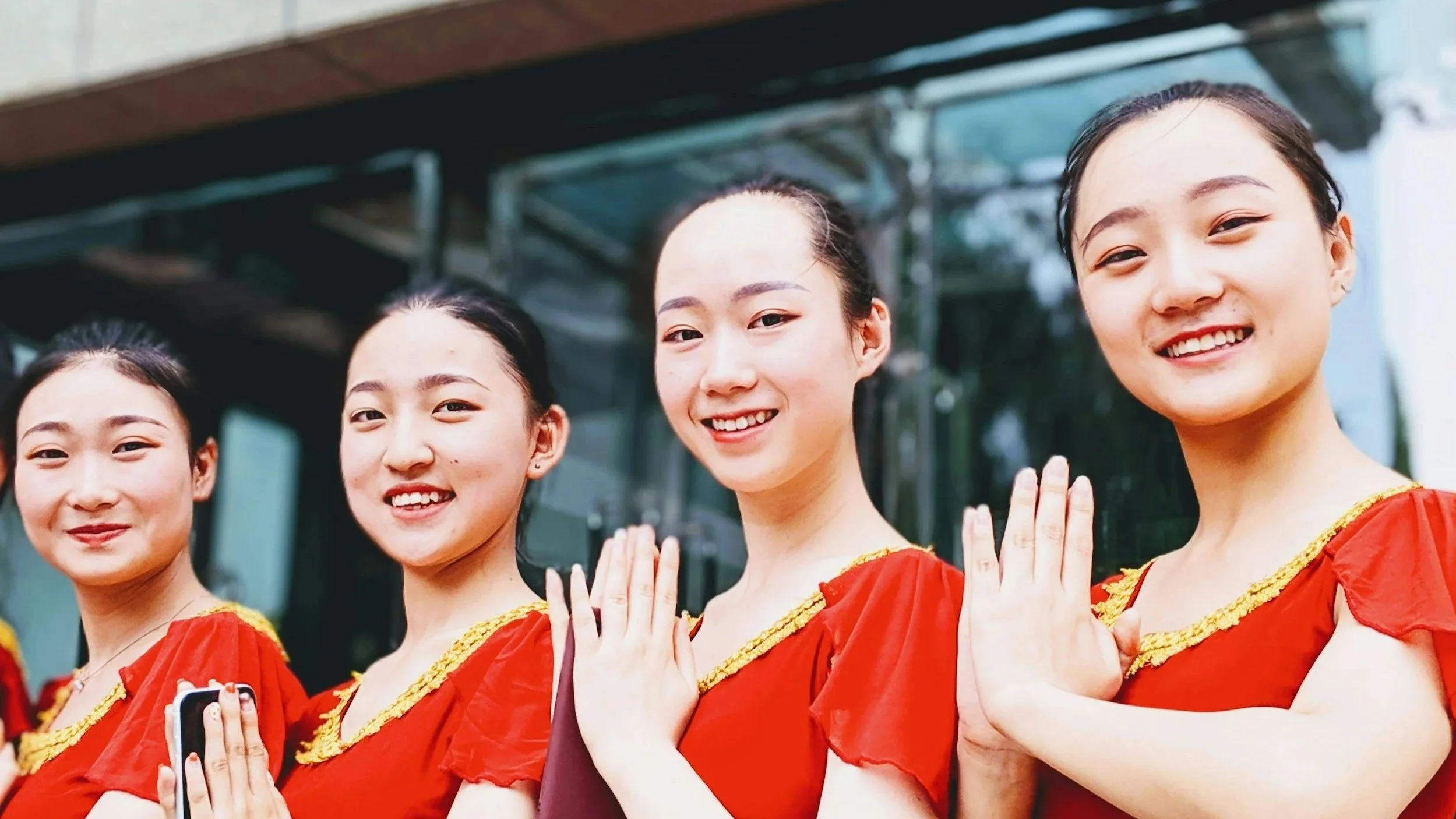Asian Money Matters: Part 5 - Ready Set - Retire
Welcome to the Fifth edition
Hello, and welcome to the fifth edition of Asian Money Matters! These articles focus on our relationship with money, with an emphasis on awareness as we journey through life’s key stages. Below is a summary of articles that have been explored:
This issue: Issue 5 explores Money matters during retirement years
Each edition concludes with some personal reflections, and a reflective exercise.
In previous issues, we explored the Spending Triangle (Physical, Emotional and Logical) and how these triggers played a vital role during early stages. In this issue, we explore the retirement journey, and how it looks different for each of us. As we journey towards retirement, our needs shift from emotional and logical drivers, towards our physical needs (health and wellness, in body and in mind).
For most Asian women, our expectation of retirement involves little more than managing our day to day overhead, and perhaps a trip here and there. The traditional retirement models of working till retirement age, and surviving off a state pension are no longer viable, which means more proactive planning to support a retirement plan that fits your future needs.
Much emphasis has been placed to message younger generations on getting educated, how to work, how to spend, but little consideration is made to educate young adults on how to plan for retirement, and understanding that different approaches are needed for investing, compared to savings. No meaningful effort has been made to cater retirement messages towards the needs of immigrants, and specifically Asian women. Retirement is something we are just expected to know, which is why as women we often find ourselves unprepared. Retirement is a complex phase, and considered the most vital chapter of life that can often involve emotional and psychological upheaval.
What does retirement mean to you?
Women live longer, work more years and yet retire with less money than men. Although we learn how to save and spend responsibly, we are never taught how to invest our money and plan for retirement.
Retirement planning is not a conversation that is traditionally discussed openly at the dinner table. The discussion holds a stigma of a phase of life that lurks in the shadows and not for the ears of our daughters, sisters or wives. Little is proactively shared within homes and communities about what retirement really means, and how to prepare and support each other. We therefore base our views mainly on watching our parents.
Prior generations lived more frugally during retirement, and single Asian women were not as common. Today’s generations expect to retire with a measure of freedom and flexibility which requires more investments than our parents, and future generations are expecting a more proactive style - to work as little as possible, and retire as early as possible, and maybe with support of inheritances.
Retirement ideally provides opportunities for enrichment, a space to experience growth, and to explore passions that many Asian women buried during their childhoods. But more often we are surrounded by messages that convince us to postpone retirement, to continue to work to place priority to those around us, making the transition to retirement a challenge - change can be difficult without role models to support us.
Key Retirement Stages:
Pre-planning (being aware of your needs and consistent savings/investing to support planned retirement lifestyle)
The actual act of retirement (takes courage)
The honey-moon phase
The adjustment stage - re-defining ones identity, and building a meaningful routine to avoid the boredom stage
The fulfilment stage - connected to what truly matters
As inflation continues to rise, more and more retirees search for options to stretch their budget, these can include downsizing, relocating, moving in with children, and for some buying a passage to retire on cruise boat.
No matter the journey, it’s important to take personal responsibility to plan and prepare as early as possible - not for doom and gloom, but for a glorious new story! Savings habits formed in early childhood are key to allowing independence in later years, and learning to adapt, adjust and re-evaluate as needs change.
How can you better plan for retirement?
Today, more and more retirees phase out their retirement – starting with a semi-retirement plans. The timing of retirement can differ for each of us. For some it can be triggered early due to bad health, and for others, it could mean to continue working through to their 70’s for financial means, or other personal motivations. For those who want to retire as early as possible, the use of diversification methods can help shield against long term economic risks.
Tools & Strategies
Don't just earn money, structure your hard earned money to grow efficiently for you
Auto save from each pay-check to take advantage of compounded interest on returns
Opt in and maximise work-place auto pension enrolment contributions
Add monthly to maximise annual lifetime ISA’s (Individual Savings Account)
Maximise annual SIPP (Self-Invested Personal Pension) contributions
Explore online tools and retirement calculators
Understand your state pension
Apply for tax relief on pension
Explore tax efficiencies, and plan with retirement tax strategies
Explore passive income strategies
Follow on-line platforms eg: Wealthypot
Re-organise by using diversification methods including platform diversification to minimise risks
It’s never too soon or too late to plan. Seek expert advice. Ask local agencies, contact services like Age UK , plan guides, and place priority on health and well-being
If retiring abroad, plan for applicable frozen pension rules
Plan, but don’t over plan or over think this stage, but focus on planning with balance and purpose.
In the UK, 16% of pensioners still live in poverty. Most women are unclear on how much is needed in their pension pots. Healthcare is one of the higher costs during retirement according to Invesco research, and rising senior care costs continue to be a concern for the retired in the UK.
One approach to help understand how much is needed to put away for retirement is the £1,000 a month rule, this combined with the 4% rule can work for some retires.
Another approach is The FIRE movement (Financial Independence, Retire Early) which encourages early aggressive savings which has gained popularity due to social media platforms Check out this blog? The concept is built around having 25 times your annual expenses, and is often combined with the 4% rule.
Types of FIRE:
Regular FIRE: According to Taylor, Regular FIRE is the most popular type of FIRE.
Lean FIRE: An option for those who plan retire using a minimalist lifestyle.
Fat FIRE: Similar to Lean FIRE, but without frugality due to having saved more wealth.
Barista FIRE: Barista FIRE balances retirement with work here and there, such as being a barista.
Coast FIRE: This option is popular with younger generations - encourages aggressive early savings.
Jordon Taylor, an advisor with Core Planning states "The importance of spending less and investing more is a Finance 101 concept called the "time value of money,'" If I give you £1 today, what will it be worth in four years? In 20 years?
Women remain challenged to comprehend what life will be like in 20 to 30 years when every-day life is stretched managing work, family obligations, mortgage payments, putting kids through college, and if time permits, to squeeze in a few fun experiences. Fortunately the Digital Age has allowed women to obtain access to financial information that was not previously easily accessible, yet cultural and social environments continue to challenge Asian women from proactively planning for their retirements.
Research from Scottish Widows’ Women and Retirement indicates that over 40% South Asian women don’t have retirement savings, and one in five Asian women plan to reduce working hours, instead of fully retiring.
More about pension
More than two-fifths (43%) of working-age Brits are under-saving for retirement,
One in three Black or Asian women pensioners are living in poverty.
Single women experience higher risk of poverty than single men or pensioner couples.
Research into ethnic inequality in retirement savings indicate that the minority pension pots are averaging less than half the size of their white British peer.
When UK increased the pension age for women, the results were an increase in women living in poverty.
The Pensions Act of 1995, has steadily increased the pension age. The next increase will be to age 67 by 2028, and age 68 by 2046. When this act was designed, it did not factor the needs of lower income pensioners, ethnic groups who are consistently dying earlier than affluent white groups. The Guardian has reported that women on average from the poorest areas of England were dying earlier.
Private pensions constitute the largest component of household wealth in the UK, and is mainly implemented through auto enrolment in workplace pension plans.
The Institute for Fiscal Studies shows that due to religious beliefs, 16% of Pakistani and 24% of eligible Bangladeshi employees on average opt out of these workplace pension plans, compared to 10% of eligible white employees. A reason for this could be explained through the Islamic finance guide, which notes that investing in profit-making ventures is not permitted. The implications is a 61% drop in retirement income.
Research finds that one in five (21%) Black women are ineligible for work auto-enrolment pension schemes as they do not meet this threshold, compared to 17% of South Asian, and just 4% of White women.
Work and Pensions Committee, reported women in their 50s have less than two thirds of the pension savings compared to men.
In July, 2025, the government announced the third review of the State Pension age. This review will consider whether the rules around pensionable age are appropriate based on the latest life expectancy data - but are likely not considering life expectancies on lower income earners, whose are dying earlier than wealthy earners.
Ageism
As Mark Twain once stated “Age is an issue of mind over matter. If you don’t mind, it doesn’t matter”
Women are living a longer life-span, but not necessarily a healthy life-span.
Due to financial constraints, more women work into their retirement years, yet employers continue to discriminate against hiring older employees.
Aging and retirement are often combined, but in reality these are two very different concepts. It was 50 years ago when US gerontologist Robert N Butler coined the phrase ‘age-ism’ an issue we are still challenged to address. Ageism, like all forms of discrimination, is pernicious.
As the global population ages, the strains on social systems steadily increase resulting in the retirement age continuing to be pushed out. The dilemma of a shortening workforce looms ahead as failing systems continue to rely on employees to work into retirement years in jobs that are often low paid and physically demanding.
Research indicates, the older you are, the more likely you are to think that old age comes later in life. Those aged between 16-24s consider old age to begin at 61. Those aged between 55-64 consider old age begins at 72. Most advertising features the under-40s, when in fact it’s the over-40s that are their key buyers. It is not just advertisers who overlook those in later life - around four in five of those aged over 55 say their favourite retail brand no longer understands their needs. We lack positive older role models from our screens, and products marketed to older age groups look clinical.
Invesco reports indicate that an average 65-year-old UK male today can expect to live to 88, while a 65-year-old UK woman expects to live past 90.
What does all this mean?
Retirement looks different for each person in each generation making it difficult to use any standardised plan. Although the act of retirement is a solo journey, supporting and educating the process remains a societal process. The PPLL (Planning and Preparing for Later) survey commissioned by the Department for Work and Pensions recognized that much work still needed to be done to prepare individuals for retirement.
As we age, our bodies demand more balance. This goes beyond just nutritious foods, and exercise activities, but also a healthy living environment and mind-set. With awareness, we can transition into our retirement years and support the changing needs of our bodies with compassion and acceptance. During our early years, we have invested a great deal of time and money on our outer needs. As we embark into retirement, our inner journey moves to takes the centre stage - with focus on well-being, and living a conscious life.
As the world continues to expand its obsession with money, we can learn much from other nations such as Japan, where retirees are thriving by using principles that balance health, wealth, and purpose making Japan consistently ranked as one of the happiest, healthiest and wealthiest nations. Money Matters drive many aspects of our life journey, but as we verge on retirement, we begin to realize that it is our well-being that is the foundation of our life journey.
Celebrate each retirement milestone - you deserve it!
Create a plan
Take on new projects
Build a routine to prioritise your time, and to avoid becoming stagnant
Opt for quality over quantity - less is more
Surround yourself with people and things that matter
Let go of all that no longer serves you, and make space for growth
Approach your health and wellness with a responsible mindset
Keep nimble to adapt to new approaches
Live with awareness (make time to meditate)
MAKE IT HAPPEN, reach out for support.
Personal Reflections
Having been raised by immigrant parents whose view of retirement was to be mortgage free, have basic savings, and to trust that state pension would cover their day to day bills, led me to feel that retirement would take care of itself. Retirement life for my parents involved daily fruitful experiences with family and friends. They took time to enjoy the simple things that life offered - and were heavily involved in the vibrant neighbourhood community that surrounded them. A community that spanned from our front door, through to the broader outskirts of town. The temple was a place of congregation that my mother appreciated. My father took solace with his close acquaintances in the pub across the road each Friday, a pub that was owned by my schoolfriend’s father. And during the week he would meet at a local hot-spot at the centre of town to swap stories with like-minded friends, a spot I would walk past each day as a teenager going home from work. Although simple from the outside, my parents built their retirement on the value of connections - an approach that provided richness through relationships, and built methodically over decades. They had no desire to travel, or to buy expensive merchandise. Their view of fulfillment was connecting with the community around them.
As I watch my sisters, I found that although each has a different view of when and how they wanted to retire, their underlying message is similar. Below are a few quotes when asking what retirement meant for them:
“To wake up knowing I have the freedom to plan my day, and not feel guilty when choosing to do nothing - knowing I have worked hard for it.”
“To own my days to do as I please, without guilt attached.”
“ My retirement was unplanned. It was triggered by illness and lack of employer support. The sudden act of retirement caused me a loss in self-fulfilment, as my identity for so long was built around my work environment. Retirement for me is not an easy path to navigate, but I have the luxury of time, and the wisdom of age to find out what truly makes me happy.”
As Asian women, when reaching our retirement years, we still struggle to value our worth, to let go of our old identities, and to give ourselves permission to enjoy this well deserved stage. Our identities have been embedded in the societal and institutional structure that have shaped our transnational lives. The word “retirement” does not easily fit within the vocabulary we were raised in. Postponing retirement is therefore common with Asian women as we struggle to allow ourselves this luxury, and often refuse to see ourself as an individual first, but continue to see ourselves as ‘women’ and all the roles and expectations that come with such identity.
I was fortunate to have travelled extensively in my earlier work years, and as I head into retirement my motivation to travel changed from the purpose of enjoyment, to the purpose of inner growth.
I attempted to retire in my 40’s, then again before COVID. Looking back I realized the lack of a realistic plan (what to do), and the lack of courage (step into unknown), hindered the successful execution of my retirement. Too much planning can also be a hinderance.
As I returned to work in my 50’s, I found my approach to work had changed. As I aged, I found myself less flexible to work in an environment that did not support my well-being, and lacked inspiration and meaningful connections.
Retiring takes a leap of faith. As I find myself again looking to plunge into retirement, I realize for me, retirement means an act of surrender, and to live life fully and completely with acceptance of the unknown - to leave behind what no longer serves me so that space can be created for new beginnings to emerge.
Self-reflection Exercise
Next we explore a self-reflective exercise. You will need a quiet comfortable space, a journal, and a candle. The focus of this exercise is to awaken within you, your awareness, and inspire within you, your natural sense of empowerment, by letting go with gratitude as you make space for new beginnings.
-
With Gratitude, honour your ability to reach the vital stage or retirement. Give thanks to all that has supported your journey, friends, family, strangers, and nature.
-
Sit with eyes closed.
When ready, with Awareness, bring attention to one key part of your body (e.g: heart, brain, feet, etc) and offer gratitude.
-
Light a candle and sit silently for five minutes watching the flame burn.
Like a Window opens for fresh air, open your heart allowing the light of the candle to nourish you. Allowing the light to wash away the struggles lingering in your mind.
-
Breath In and repeat: I am in Acceptance with all that I was, all that I am, and all that I will become.
Pause.
Breath out: I let go of all that no longer serve me.
Repeat seven times.
-
With closed eyes, feel unconditional Kindness to all that surrounds you.
-
Place your feet on the ground and Engage, feeling the grounding aspects of mother earth.
-
Journal your insights with curiosity, love and appreciation.
Summary
As Asian women, we struggle from birth to death navigating rigid cultural beliefs, systemic systems, and demanding lifestyles - yet we alone have the power to change our story. By gaining awareness and empowering ourselves to place as much priority on our inner needs, as we do on our outer needs, our approach to retirement can allow us to gracefully embark on this passage with dignity and ease, rather than with lack and uncertainty.
As we mould ourselves and lean into this journey, we begin to appreciate and find sense of what it means to live differently - retirement can truly become a fulfilling and fruitful passage leading us to a rich and rewarding adventure - a phase that connects us to our inner energies where we might discover that it’s not money that matters, but our outlook that truly matters!
The following is a quote by Oprah Winfrey:
“If you look at what you have in life, you’ll always have more. If you look at what you don’t have in life, you’ll never have enough.”
Your feedback on the Asian Money Matters series is welcomed at support@ambercommunity.net
References:
https://reformedjournal.com/2024/11/25/paul-mccartney-and-me/
https://www.invesco.com/content/dam/invesco/emea/en/pdf/Invesco_Retirement_Series_Part_6.pdf
https://rebeccabeaton.com/what-should-i-do-with-my-life-a-step-by-step-process/
https://www.amazon.ca/Swedish-Art-Aging-Well-Probably/dp/1982196629
https://www.businessinsider.com/retired-early-and-back-to-work-made-these-mistakes-2025-8
https://www.ageuk.org.uk
https://www.moneyhub.co.nz/fire-vs-leanfire-vs-fatfire-vs-barristafire-vs-coastfire.html
https://www.businessinsider.com/personal-finance/investing/financial-independence-retire-early
https://www.investopedia.com/articles/retirement/07/sixstages.asp
https://marstonliving.com.au/what-are-the-five-stages-of-retirement/
https://www.cbsnews.com/news/what-is-a-good-monthly-retirement-income-in-2025/
https://www.theprivateoffice.com/insights/average-retirement-income#:~:text=On%20face%20value%20the%20question,date%20Government%20Pensioners'%20Income%20figures.
https://www.businessinsider.com/personal-finance/investing/financial-independence-retire-early
https://www.moneyhub.co.nz/fire-vs-leanfire-vs-fatfire-vs-barristafire-vs-coastfire.html
https://www.the-ifw.com/blog/retirement-planning/what-is-1k-month-retirement-rule/
https://www.asian-voice.com/News/UK/Over-a-third-of-South-Asian-communities-in-the-UK-are-on-track-for-a-comfortable-retirement
https://www.seniorhomeplus.co.uk/blog/active-well-being/the-impact-rising-healthcare-costs-elderly-people-what-changes-are-needed
https://www.retirementlivingstandards.org.uk/2023_research_report.pdf
https://www.nytimes.com/2023/01/07/world/asia/japan-workers-retirement.html
https://am.landg.com/asset/4a7e00/globalassets/lgim/capabilities/defined-contribution/dc-retirement-solutions/the-ethnicity-pensions-gap-report.pdf
https://ifs.org.uk/sites/default/files/2025-01/WP202502-Ethnic-differences-in-wealth-accumulation-in-the-UK_0.pdf








